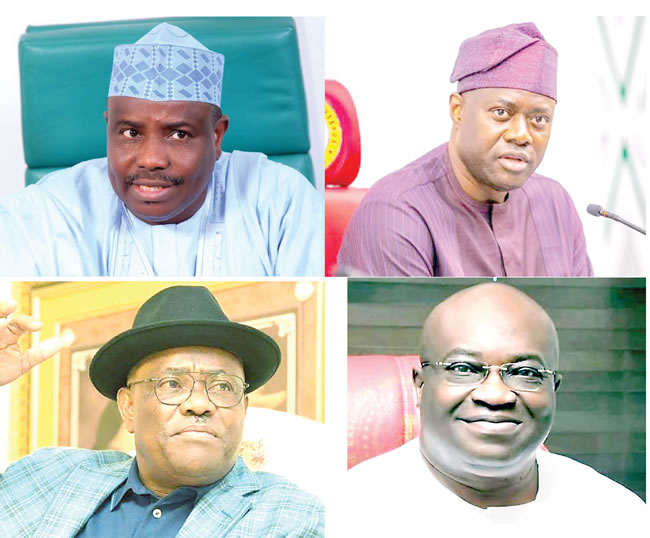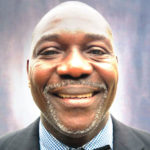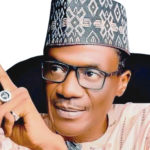LEON USIGBE reviews the stance of the Peoples Democratic Party Governors Forum in their recent meeting in Aba, Abia State.
At least three governors of the Peoples Democratic Party (PDP) have thrown their hats into the ring of the presidential race, seeking to become the standard-bearer of the main opposition party in next year’s race. Aminu Tambuwal of Sokoto State, Bala Mohammed of Bauchi State and Nyesom Wike of Rivers, have all obtained their expression of interest and nomination forms and are now traversing the length and breadth of the nation seeking support for their ambitions.
Not unexpectedly, their aspirations have engendered what is, for now, a benign polarisation in the PDP Governors Forum (PDP-GF), their umbrella peer-review platform, because the individual aspirants have drawn sympathy from some of their colleagues in the forum who are urging them on.
But that division was blurred Wednesday March 23 when the South-East city of Aba, Abia State played host to their regular monthly meeting. As it is usually the case, the meeting was held to review the state of the nation, but it also provided the state chief executives the opportunity for more bonding, and perhaps, a little politicking in a relaxed and less distractive atmosphere.
Governor Okezie Ikpeazu, the host, ensured to take the meeting to his country home rather than the usual Government House venue of such exercise. He provided a gay atmosphere in the spacious mansion with huge flex banner decorations in PDP colours, highlights of his personal achievements and a celebration of the individual guests. Aba residents, who probably had not witnessed such gathering of 13 governors in one fell swoop, were warm and receptive to the visitors, not just the governors, but their aides, other politicians who came to cash in on the opportunity and, as well, every other person connected with the exercise. As it is now the common practice among them, the governors adopted the traditional attire of the Abians frequently donned by Governor Ikpeazu, as the uniform for the one-day occasion.
After hours of deliberations, the governors saw very little light at the end of the tunnel under the President Muhammadu Buhari-led All Progressives Congress administration and ripped into its poor performance in governance after seven years at the helm. They blamed the revenue leakages occurring in the Nigerian National Petroleum Company (NNPC) Limited on the continued retention of the minister of petroleum resources portfolio by President Buhari, positing that the solution to the problem is for the office of the minister to be separated from that of the president.
A communiqué read by the chairman of the Forum, Governor Tambuwal, alerted that the NNPC deducts N8.33 billion monthly for the rehabilitation of the refineries in Nigeria but till date, no refinery is working. It also maintained that NNPC deducted N788.78 billion for various investments between 2018-2021 on priority projects of the nation’s oil industry without recourse to the Federation Accounts Allocation Committee (FAAC) even as they rejected claims by the company to have paid about N1 trillion in petroleum subsidy in one year.
Flanked by other governors at the end of the meeting, Tambuwal read the communiqué to the media, adding: “NNPC in 2021 alone claimed to have paid over N1trillion as petroleum subsidy. Indeed, the month of March 2022, N220 billion was deducted as oil subsidy with a promise that N328 billion will be deducted in April 2022. This is unacceptable. NNPC and FIRS as well as other remitting Agencies continue to apply an exchange rate of N389/$1 as against the Import and Export window of N416/$1. The extent of this leakage can be better felt, if this rate is compared to the current N570/$1. From available records about N7.6T is withheld between 2012 and 2021, by NNPC from the Federation Account. All these are said to be payments for oil subsidy. Conclusively, we believe that all these leakages in NNPC have been made possible because the President is also the Minister of Petroleum. The urgent separation of these two portfolios has become necessary.”
The PDP governors similarly expressed alarm over various reports and claims of incidents of stealing of crude oil ranging from 80% to 95% of production made by industry practitioners and called on the Federal Government to set up an appropriate mechanism to reverse this trend and bring perpetrators to account. They decried the inability of the NNPC to make its statutory contributions to the Federation Account in spite of oil selling at above $110, arguing: “It is patently unconstitutional for NNPC to determine at its whim and discretion when and what to pay to the Federation Account, as it is a mere trustee of the funds for the three tiers of Government: Federal, States and Local Governments.
“We once again, call for investigations and audit of the quantity of consumption of fuel ascribed to Nigerians and for deployment of technology at the filling stations to determine in a transparent manner the volume of consumption,” and threatening that, as governors, they would resist any further attempt by NNPC to ascribe unsubstantiated subsidy claims to other tiers of government.”
The PDP state chief executives reminded the APC how much better conditions were under the former ruling party when compared to what the citizens go through today and consequently, expressed the readiness of the PDP to retake power in 2023 to correct the disruption to individual lives and the economy. They affirmed after reviewing “the excruciating hardship and suffering being meted out to Nigerians by a failed APC led Federal Government; the near collapse of the APC as a viable political party, the readiness of the PDP to take over and offer qualitative leadership options to rescue the nation.”
The communiqué added: “We lament the terrible pain and hardship facing Nigerians in virtually all aspects of life. The meeting noted that life was much better in 2015 under the PDP than today under the APC as exemplified in the following Comparative Indicators obtained mainly from the National Bureau of Statistics: Diesel which is critical for running of SMEs was N131.47 in 2015, it now costs above N700; fuel: Official and Black-Market was N87/155 in 2015, it now costs N167/350; Aviation Fuel/Air Ticket Rate on Domestic Flights was N110 per Litre/N18,000 in 2015, it now hovers around N700 per Litre/N70,000, where available. Indeed, the scarcity of fuel which has resulted in loss of several man hours is a disgrace to Nigeria.
“The collapse of the national grid (126 times in 7 years – (June 2015 to March 2022) and its consequences for non-availability of power is most unfortunate. Kerosene (NHK) used by the ordinary Nigerian for cooking and power was N180 in 2015, it now sells at ₦450; Liquefied Petroleum Gas (LPG) – 12.5kg Cylinder sold for N2,400 in 2015, is now sold at between N8,750 and N10, 000. Prices of basic foodstuffs are now three times higher than what they used to be in 2015. Staple foods such as rice, beans, cassava flakes are now slipping out of the hands of average Nigerians. Indeed, a bag of rice sold for N8500 in 2015 is now N39,000.
“Electricity was N14.23 per kilowatt in 2015, it is now N38.530, and not even available; unemployment rate was 11.4% in 2015, it is now over 33%, one the highest in the world; and the poverty rate in 2015 was 11.3% but now about 42.8%. Accumulated inflation in 2015 was about 4%, it is now 15.50%; Inflation Rate was 9.01% in 2015 and now 15.7%. Perhaps the exchange rate has been one of the most disastrous. N150 to a dollar was the parallel market (patronised by most businessmen and Nigerians) rate in 2015, it is now about N580 to $1 in the parallel market and still rising.
“Debt and debt servicing: domestic debt of N8.4t and external debt of USD 7.3b was incurred between 1999-2015. While domestic debt of N7.63t (June 2015-Dec 2020) and USD28.57b as of Dec 2020 was incurred. External debt of USD21.27b was incurred between June 2015 and 2021. National debt to GDP ratio was 23.41% (2016) it is now 36.88% (2022).
“The Corruption Index has risen from 136 in 2015 to 150 now; Nigeria’s Misery Index, an indicator used in determining how economically well off the citizens of a country are, is usually calculated by adding the seasonally adjusted unemployment rate to the annual inflation rate, has moved from 14.75 per cent in 2015 to 50.48 (2021) and the major threat to the agricultural sector and food security in Nigeria is insecurity.
“In the North-East of Nigeria, it is estimated that no fewer than 70,000 hectares of arable farmland have been abandoned in the affected states and local government areas. The trend is the same all over the country. This further contributes to food inflation. The APC-led Federal Government must take steps to cooperate with states to bring security down to the grass roots.”
The PDP governors were of the view that given the distressing statistics, the APC should not be seeking to remain in power in 2023, noting: “The Forum is surprised that in the face of these statistics of complete failure in all ramifications and areas, the APC still wants to be on the ballot in 2023.This shows how uncaring and insensitive the APC is. It has become a menace to Nigeria.”
Twelve governors and one deputy attended the Aba event.






